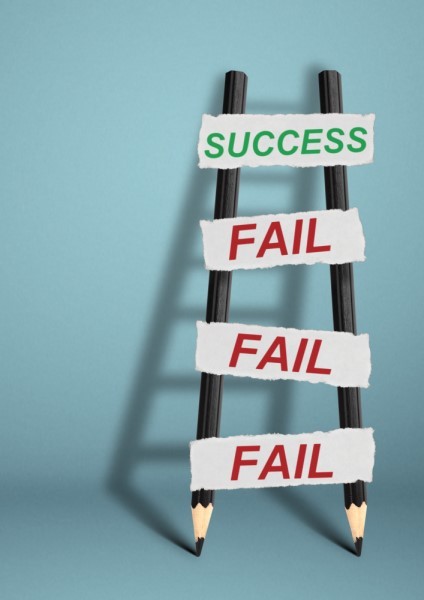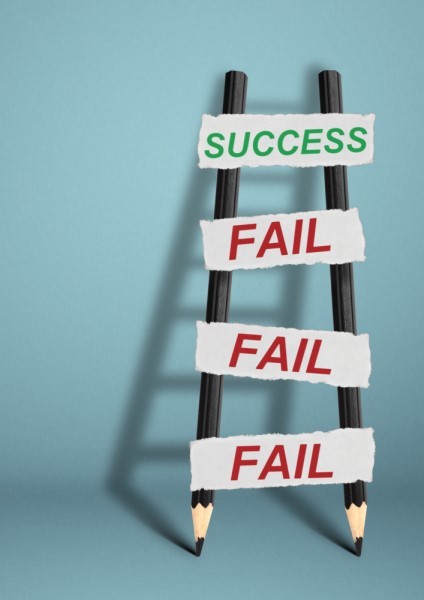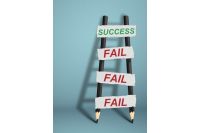

Failing the counseling exam is an abiding fear looming over would-be counselors pursuing their Master's degree and then their internship work. There’s a reason for this fear, seeing that 40-45% of people taking the National Clinical Mental Health Counseling Examination (NCMHCE) fail.
But could failing the NCMHCE or the NCE ever be a good thing? In an article for Counseling Today, Alyson Carr shares that her experience failing the counseling exam turned out to be positive because of the lessons she learned from it.
“The day I failed the National Clinical Mental Health Counseling Examination (NCMHCE) was the best day of my life,” wrote Carr, who now has a PhD in Counselor Education. “I didn’t know this on the day it happened, of course, because my judgment was clouded by lots of tears, snot and defeat.”
The problem was not that Alyson had not prepared or didn’t feel ready. She explains,
I did a lot of preparation. I worked really hard for that big “F.” I consulted with colleagues who had successfully passed their exams about the materials they had used to prepare, I studied every day for three months, my husband quizzed me in the mornings before work and I performed really well on the practice exams before I went into the real deal.
I was ready. I was ready to pass something for which I had worked so hard. I was ready to finally see the letters LMHC (licensed mental health counselor) after my name. I was ready to reach more people in need.
So what was the problem? Why didn’t Alyson pass the NCMHCE?
Part of the problem was anxiety, the type of anxiety we all struggle with when we’re thrown into a situation that tests the limits of our competency. When Alyson saw herself getting multiple wrong answers in a row, she panicked, thinking it meant certain failure. Of course, by telling herself that she was failing, Alyson made it more likely that she would fail. Expecting to fail, Alyson caused her anxiety to spike even more, thus trapping herself in a vicious cycle of negativity and defeat.
But anxiety was only one part of the problem. During the three months before she could retake the test, Alyson also had to face the truth that, despite all her hours of preparation and despite the perception that she had been ready, she had not been fully prepared.
If I had been more prepared, I would have been able to recover from losing all of those points. If I had been more prepared, I would have had a larger margin for errors. I panicked because any sensible counselor would have entertained the same question I did: If I’m not prepared to pass this exam, am I really the best person to be in a position of counseling clients who deserve the highest quality of care? Pondering this question caused me more emotional distress than failing 2 the exam ever could. I bet a lot of registered interns who have failed ask themselves the same thing….
Looking back, I can see that passing the exam wasn’t necessarily my goal. Instead, my goal was to pass and feel like I should have passed. If I had passed on my first attempt, I can say with complete confidence that it would have been the result of pure luck. My clients would not have been getting the caliber of care they deserved because I would have been a licensed professional with a false sense of confidence about my abilities. Taking this into consideration, I became grateful for being a failure because, in my case, being a failure meant not being a phony.
In the interval before taking the test again, Alyson confronted these problems head-on. First, she came up with specific strategies to alleviate her test-taking anxiety on the day of the exam. These strategies included things like regular trips to the bathroom at the end of every section of the test to practice deep breathing. Secondly, she confronted the problem of how to be fully prepared. This included using systematic measures to identify her areas of weakness and assess her levels of improvement.
When Alyson walked out of the testing room lobby the second time, she had accomplished something far more valuable than simply achieving a passing grade. She had also learned an important lesson that she now uses when mentoring others:
…success tastes so much sweeter when you know you’ve truly earned it. There will be times in your life when you will fail. The experience of picking yourself up afterward will vary depending on the failure. But it’s not the getting knocked down that defines who you are; it’s how you define failure and success and how you conceptualize the complexity of personal growth and development.
Further Reading



